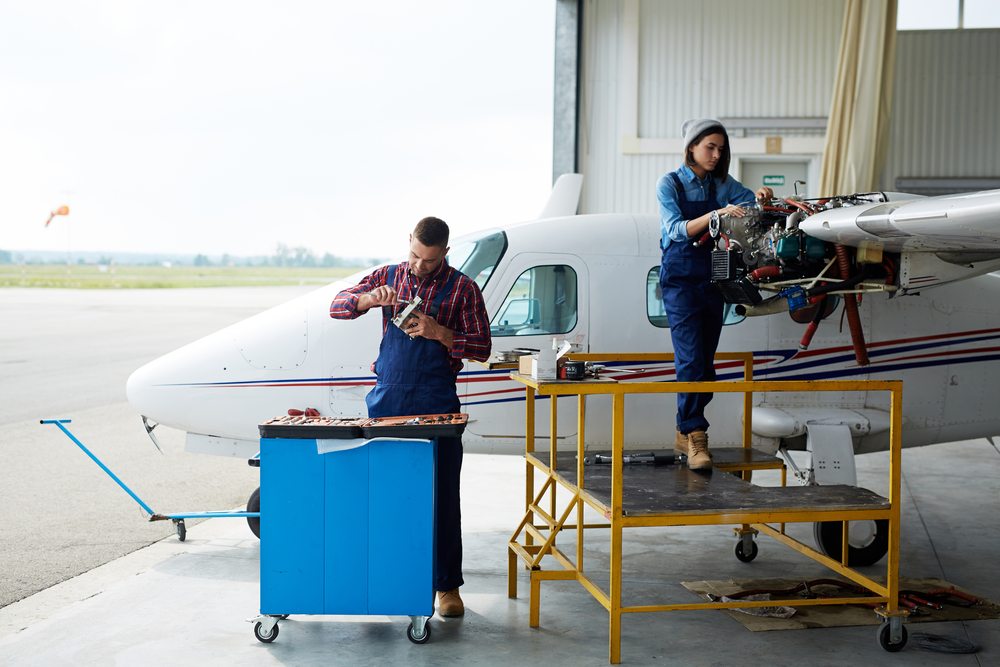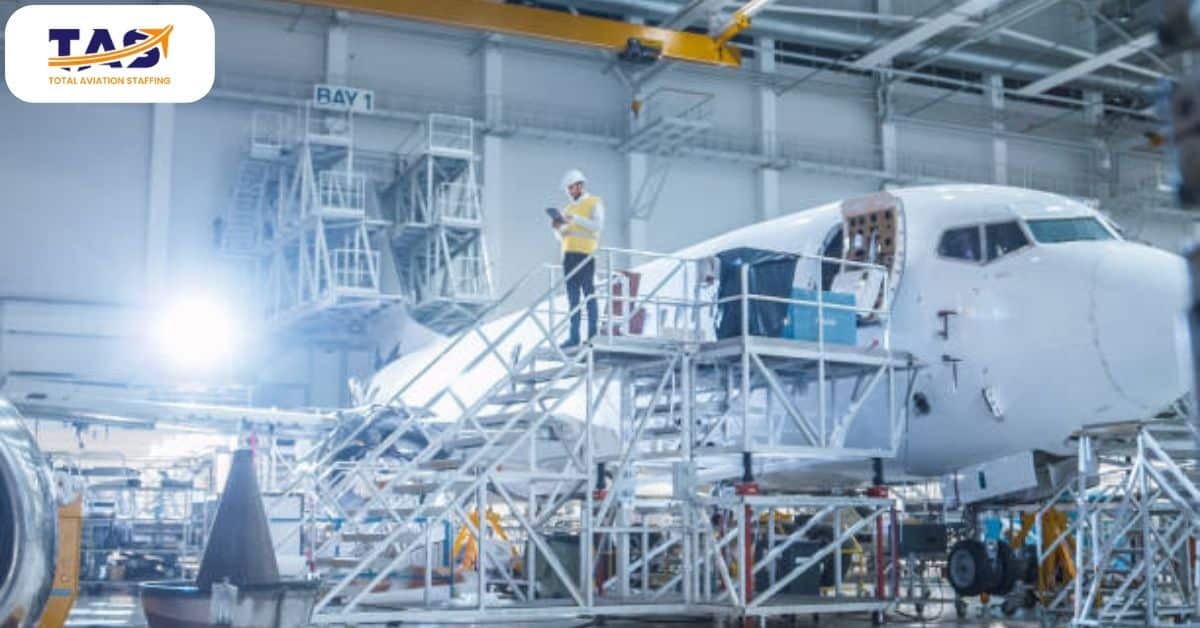Are you looking forward to your interview to become an Aircraft Structures Technician? As you get ready, it’s important to be ready for any question that might be asked.
Here is a list of some of the most common and important questions that you might be asked at your interview to help you. You’ll be sure to impress your interviewer and improve your chances of getting the job of your dreams if you take the time to prepare thoughtful and detailed answers to these questions. So, let’s get started!.
Landing an aerospace technician role is no easy feat The competition is fierce and the stakes are sky-high One wrong move during the interview process and your dreams of working on complex aircraft systems could come crashing down.
But with the right preparation, you can ace that interview and launch your career to new heights. This comprehensive guide will equip you with insights into the top 30 most commonly asked aerospace technician interview questions.
Whether you’re a fresh graduate or an industry veteran knowing what questions to expect can help you formulate winning answers that highlight your skills and experience. So let’s get ready for takeoff!
Sizing Up Your Technical Knowledge
Aerospace technician roles demand in-depth technical knowledge. Interviewers will probe your understanding of engineering principles, aircraft systems, tools, and regulations. Be ready to demonstrate your expertise.
Q: How much experience do you have with hydraulic systems in airplanes? How would you figure out that the system is broken?
This question checks how much hands-on experience you have and how well you can solve problems for a very important aircraft system. Show off your technical skills by going through a step-by-step diagnostics process that is designed to help you find and fix the problem quickly. Emphasize safety at every step.
Q: How familiar are you with CAD software and its aerospace applications?
CAD proficiency is a prized skill for designing and modeling aircraft components. Discuss your level of experience with common CAD programs like SolidWorks and AutoCAD. Provide examples of aerospace-related projects where you successfully applied these tools.
Q: What do you know about aircraft propulsion systems? Describe a project demonstrating this.
With this question, interviewers want to gauge your working knowledge of propulsion systems. Respond by outlining theoretical concepts that govern these systems and provide an example project where you applied them in a practical, real-world context.
Proving Your Technical Skills
You’ll need to demonstrate hands-on abilities in maintaining, troubleshooting, and repairing aircraft systems. Interview questions will assess how you’d apply your technical skills in practice.
Q: How would you troubleshoot an electrical malfunction on an aircraft?
Highlight your systematic approach, such as examining circuit diagrams to trace the issue, using diagnostic equipment to test components, and replacing damaged parts. Emphasize adherence to safety procedures.
Q: What steps would you take when performing routine maintenance on an aircraft engine?
Showcase your understanding of engine subsystems and components. Walk through detailed inspection, testing, and maintenance procedures aimed at preventing issues and optimizing performance.
Q: How do you stay updated on the latest aerospace technologies and best practices?
Discuss proactive efforts like reading industry publications, taking online courses, attending conferences, and joining professional organizations. Demonstrate enthusiasm for continuous learning.
Demonstrating Problem-Solving Abilities
Complex and unexpected problems are par for the course. Interviewers will assess your critical thinking and troubleshooting skills with scenario-based questions.
Q: If a critical system unexpectedly failed during a test flight, how would you respond?
Highlight calmness under pressure. Discuss diagnosing the issue, tapping team resources, and documentation. Emphasize following emergency protocols and prioritizing safety.
Q: How would you troubleshoot an aircraft engine issue causing unusual vibrations?
Showcase analytical thinking and attention to detail. Walk through gathering engine data, identifying patterns, isolating components, and deducing the root cause through methodical testing.
Q: How would you prioritize tasks when dealing with multiple aircraft repairs under tight deadlines?
Demonstrate strategic thinking and efficient delegation skills. Discuss prioritizing based on severity, optimizing workflow, and maintaining open communication to deliver quality work on schedule.
Addressing Safety and Compliances
Aerospace technology demands strict adherence to safety and regulations. You’ll need to demonstrate deep knowledge in this area.
Q: What methods do you use to ensure quality control and compliance in your work?
Highlight vigilance through measures like regular audits, controlled documentation, and integrating guidelines into operating procedures. Convey your understanding of why compliance is critical in aerospace.
Q: How do you stay up-to-date with industry safety standards and regulations?
Discuss habitual learning through training, industry resources, and professional networks. Demonstrate a proactive approach to updating your knowledge as protocols evolve.
Q: How would you respond if a supervisor pressured you to take unsafe shortcuts to increase productivity?
Assertively decline acting unsafely, emphasizing your duty to follow protocols. Offer suggestions for increasing efficiency while upholding safety standards. Stress the importance of integrity.
Providing Examples From Experience
Interviewers will dig for real-world examples that provide tangible evidence of your abilities.
Q: Share an example of a complex mechanical issue you helped resolve.
Pick an example that showcases specific troubleshooting steps taken and highlights critical thinking, technical knowledge, and communication skills applied. Quantify the positive impact of your solution.
Q: Describe a time you successfully collaborated in an aerospace project.
Choose an example that demonstrates teamwork, communication, and project management skills. Share how you leveraged colleagues’ strengths and overcame challenges together.
Q: When have you had to make a quick critical decision under pressure?
Recount remaining calm in a high-stakes emergency situation, applying technical expertise to rapidly diagnose issues, and making the right call to ensure safety.
Showcasing Your Potential Value
It’s important to convey how you’ll positively impact the employer. Come prepared to share your unique value.
Q: Why are you interested in this aerospace technician opportunity?
Express genuine enthusiasm for the company and role. Share how your skills and experience perfectly align with their requirements.
Q: What strengths would you bring to our maintenance team?
Pick two or three top strengths fitting the role like technical expertise, problem-solving ability, and safety-focused. Provide on-the-job examples demonstrating these strengths in action.
Q: Where do you see your aerospace career in five years?
Present an ambitious yet realistic vision aligned with the company’s objectives. Share your plans to continue developing your technical expertise and leadership skills. Demonstrate commitment.
With preparation and practice, you’ll be primed to tackle any interview scenario thrown your way. Use these tips and top questions to highlight your technical capabilities, problem-solving skills, safety knowledge, and genuine passion for all things aerospace. You’ve got this! Now go ace that interview and achieve your career dreams.

How do you prioritize and manage your workload when working on multiple projects simultaneously?
As an Aircraft Structures Technician, juggling multiple projects is just another day in the cockpit. Don’t freak out when the interviewer asks how you handle your work; this is your chance to show them that you’re great at staying organized and on task. Share how you set priorities, use your time well, and perform well when you’re under a lot of stress.
Here’s how to answer this question effectively:
- Is there a way you figure out how important and urgent each project is?
- Talk about how you set reasonable due dates and timelines for each project.
- Describe how you talk to other technicians, project managers, customers, and other stakeholders to make sure everyone is on the same page.
- Give some examples of how you’ve dealt with conflicting priorities and sudden changes in your workload.
You’re accustomed to smoothly managing multiple projects in the fast-paced aviation industry. Emphasize your ability to assess urgency, set realistic timelines, and effectively communicate with stakeholders. You’ll show that you’re a reliable professional who can keep projects on track and deliver results with flying colors thanks to your great organizational skills and ability to stay calm under pressure.

Can you walk me through your process for interpreting and understanding aircraft drawings and schematics?
The ability to interpret and understand aircraft drawings and schematics is crucial for an Aircraft Structures Technician. This question is a great opportunity to showcase your knowledge and experience in this area. When answering this question, it is essential to provide a clear and concise explanation of your approach.
Here are some tips on how to answer this question:
- Start by talking about how important it is to understand aircraft schematics and drawings.
- Describe how you will look over and understand the drawings, including how you will find the most important parts and features.
- Talk about how you connect the drawings to other documents, like engineering specifications and maintenance manuals.
- Give some examples of how you’ve used your knowledge of aircraft schematics and drawings to figure out what was wrong and fix it.
Don’t be a puzzle piece that doesn’t fit when it comes to figuring out what aircraft drawings and schematics mean. Show off your ability to figure out what those complicated lines and symbols mean. This is your chance to show the interviewer that you’re not just a Technician but a real expert at reading airplane blueprints.
Because you are so good at technology and pay close attention to details, you’re like Sherlock Holmes in the aviation world. You put together the structural puzzle very carefully. So, get ready to impress and show them that you’re the missing link they’ve been searching for!.

AIRCRAFT MAINTENANCE TECHNICIAN INTERVIEW QUESTIONS AND ANSWERS (Quick & Powerful Answers!)
FAQ
What questions are asked in an aerospace interview?
What kind of questions are asked in tech interview?
Why do you want to work in aerospace?
How do I prepare for an aerospace engineer interview?
If you have an interview for an aerospace engineering role, it’s important to prepare for both technical and behavioral questions that test your capabilities. In this article, we discuss common and technical aerospace engineer interview questions that can help you get ready in advance so you can have a positive first impression on hiring managers.
What are the most common aircraft maintenance interview questions & answers?
These are some of the most common aircraft maintenance interview questions and answers: 1. Why Are You Interested in This Position? This is an opening question to get you talking and pave the way for other questions to follow.
What does an aerospace engineer do?
Aerospace engineers work with both aeronautical and astronautical applications, and this question helps employers assess your ability to perform technical tasks that can support both sectors in aircraft and spacecraft design. In your answer, be sure to highlight how your contribution was successful when describing your work with automated systems.
What motivates you to become an aircraft maintenance technician?
Aircraft maintenance is a highly stressful field. You, therefore, need some motivation to keep you going. On the safe side, do not mention extrinsic rewards but mainly focus on the extrinsic ones. Desist from answers such as money, leave, and holidays. I have come to learn that I am motivated by the passion I have for aircraft maintenance.
